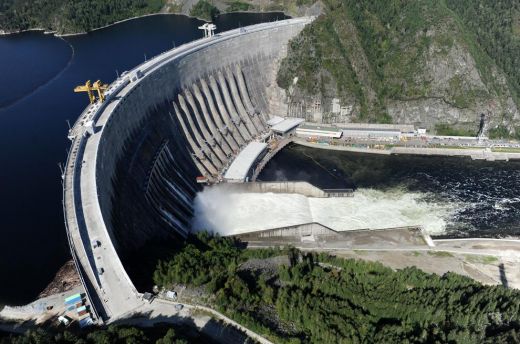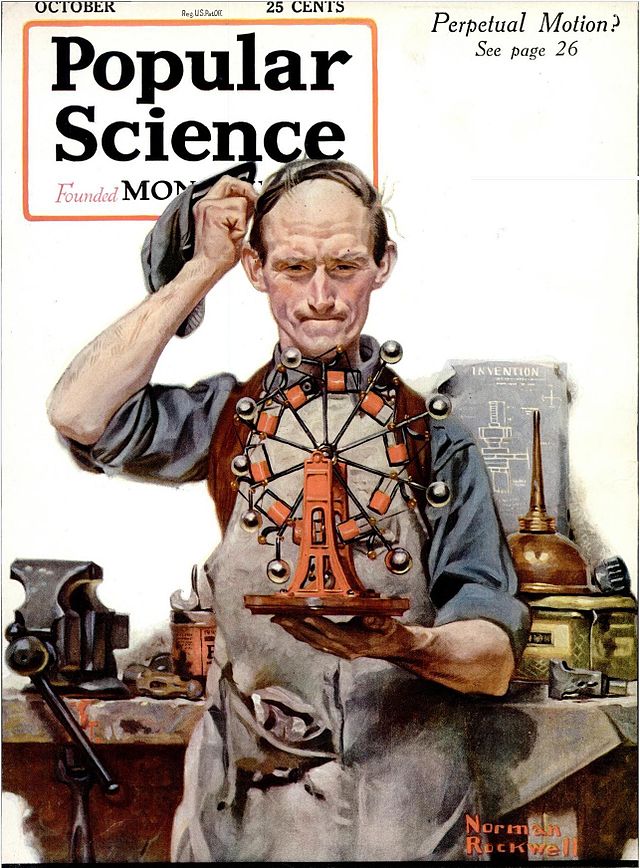If Infinite Time Passes Then Do Events Happen Again
Physicist: If you wait forever, and then you might see something happen. But the more applied answer is: no.
The universe does a lot of stuff (for example, whatever y'all did today), but literally everything that ever happens increases entropy. In some sense, the increase of entropy is equivalent to the statement "whatsoever the most overwhelmingly probable thing is, that's the matter that will happen". For instance, if you pop a balloon in that location'south a chance that all of the air inside of it volition stay where it is, but it is overwhelmingly more likely that it will spread out and mix with the other air in the room. Similarly (merely a little harder to picture), energy also spreads out. In particular, heat energy always flows from the hotter to the libation until everything is at the same temperature (hence the proper noun: "thermodynamics").
If you make it front end of that period you can get some work done.

All machines demand to be between a "source" and a "sink". If the source and sink are at the same temperature, then there's no reason for energy to menstruation and the machine won't piece of work. For example, if the water were already steam (not previously cold), and then it won't expand and you can't employ it to practice piece of work.
"Usable energy" is energy that hasn't spread out yet. For example, the Sun has lots of oestrus energy in one (relativity small) place. Ironically, if you were in the centre of the Sunday, that energy wouldn't be accessible considering there's nowhere colder for information technology to catamenia (nearby).
The spreading out of energy can exist described using entropy. When energy is completely and evenly spread out and the temperatures are the same everywhere, then the system is in a "maximal entropy state" and there is no remaining useable free energy. This situation is a little like building a h2o cycle in the heart of the bounding main: at that place'due south plenty of h2o (energy), only it'southward not "falling" from a higher level to a lower level so we can't employ it.

Useable energy requires an imbalance. If all the water were at the same level at that place would be no way to apply it for power.
The increase of entropy is a "statistical law" rather than a physical law. You'll never see an electron suddenly vanish and yous'll never see something moving faster than light because those events would violate a physical law. On the other manus, you'll never run into a broken glass all of a sudden reassemble, not because it'southward incommunicable, but because it'southward super unlikely. A spontaneously unbreaking drinking glass isn't physically impossible, information technology's statistically impossible.
However, when you look at really, really minor systems y'all find that entropy will sometimes decrease. This is made more explicit in the "fluctuation theorem", which says that the probability of a organization suddenly having a drib in entropy decreases exponentially with size of the drop.
For case, if yous have a fistful of coins that were in a random organisation of heads and tails and toss them on a table, there'due south a run a risk that they'll all state on heads. That'due south a decrease in the entropy of their faces, and there is absolutely no reason for that non to happen, other than being unlikely. But if you do the same matter with two fistfuls of coins information technology's not twice as unlikely, information technology'southward "squared as unlikely" (that should be a phrase). 10 coins all landing on heads has a probability of about 1/one,000, and the probability of 20 coins all landing on heads is about ane/1,000,000 = (1/1,000)two. The fluctuation theorem is a lot more subtle, only that'southward the basic sorta-thought.
The "estrus death of the universe" is what you get when you lot starting talking about the repercussions from ever-increasing entropy and never stop asking "and then what?". Eventually every course of useable energy gets wearied; every kind of energy ends up more-or-less evenly distributed and without an imbalance there's no reason for it to flow anywhere or do work. "Heat death" doesn't necessarily hateful that there'due south no rut, merely no concentrations of heat.
But fifty-fifty in this nightmare of homogeneity nosotros tin expect occasional, local decreases in entropy. Just as there's a take a chance that a broken glass will unbreak, there'due south a chance that a pile of ash will unburn, and in that location's a chance that a young (fully-fueled) star will accidentally course from an fantastically unlikely collection of scraps. There'due south fifty-fifty a risk of a fulling operation brain spontaneously forming. Simply just to be articulate, these are all actually unlikely. Actually, really unlikely. Every bit in "in an space universe over an space amount of time… maybe". We do come across entropy reverse, but only in tiny quantities (like fistfuls of coins or the arrangements of a few private molecules). Something like the air on 1 side of a room (that's in thermal equilibrium) suddenly getting 1° warmer while the other gets 1° colder would literally be the least likely matter that's ever happened. The universe all of a sudden "rebooting" after the heat death is… less likely than that. Multivac interventions all the same.
Those events that look like decreases in entropy have always been demonstrated to be either a matter of not taking everything into account or simply being wrong.

Fun fact: Patents for perpetual move machines are the only patents that require a working model. However another instance of the scientific conspiracy at work!
Long story short: yeah, after the heat death there should still be occasional spontaneous reversals of entropy, but they'll happen exactly as oftentimes as you might expect. If you intermission a drinking glass, don't concord your jiff. Get a new glass.
Source: https://www.askamathematician.com/2015/03/q-after-the-heat-death-of-the-universe-will-anything-ever-happen-again/